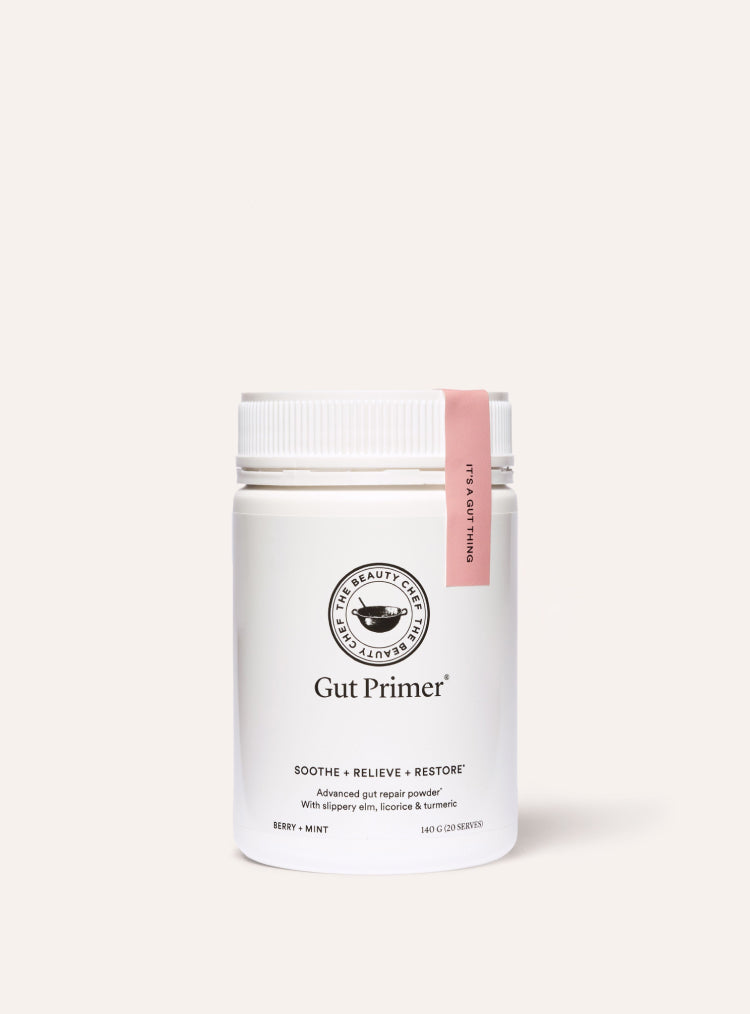
When it comes to fostering good gut health and overall wellness, there is one factor that can have more impact—both good and bad—than anything else: food.
We are what we eat and at The Beauty Chef when we talk about our gut and our gut microbiome, we often refer to it as being like a garden. For a garden to thrive and flourish, it needs to be tended to with care and fed a variety of nutrients, vitamins and minerals—and the same goes for our gut. Everything that passes our lips impacts our gut health, our gut bacteria, microbial balance and diversity—and subsequently can affect our overall health, mental health, immunity, beauty and wellbeing.
Given that what we choose to eat can either help to heal our gut or harm it—it’s essential we pay attention to our diet and choose the best foods to feed and nurture the microorganisms in our belly wherever possible.
Fermented foods
Rich in good bacteria, fermented foods are particularly beneficial for gut health and digestive system as they not only improve the bioavailability of nutrients—meaning that the nutrients you consume are more easily digested and assimilated by the body—but they also provide the gut with a healthy dose of beneficial bacteria (such as Lactobacillus and Bifidobacteria). You are also more likely to receive a wide variety of species and strains of probiotic bacteria from fermented foods than if you were to take an over the counter probiotic supplement—as these typically contain only a few specific species or strains. The probiotic benefits of fermented foods have also been well-researched and are proven to help bolster gut wall integrity, modulate and support the immune system, reduce gut inflammation and also improve overall digestion and bowel function (aka helping to combat bloating, diarrhoea and/or constipation).
What’s perhaps even more incredible, however, are the gut health benefits of the postbiotics which are produced as by-products of the fermentation process. Put simply, when probiotic gut microbiota feed on nutrients, the waste left behind are known as postbiotics—and emerging research shows that these clever compounds can actually combat inflammation, pathogenic bacteria and modulate immune function.
To soak up the gut health benefits of fermented foods for yourself, stock up your pantry with sauerkraut, kimchi, kefir, miso, tempeh, cultured yoghurt and The Beauty Chef probiotic products, of course. Fermented using the Lactobacillus species of bacteria, our supernutrient blends are formulated to improve gut health, immune health, beauty and wellbeing.
Antioxidant & polyphenol-rich Plants
You’ve likely heard the health advice: eat the rainbow. This is because the more colourful the fruit or veggies, the larger nutritional punch it packs. More depth of colour means more antioxidants and beneficial plant compounds including polyphenols—which research shows help to maintain and bolster gut health and modulate microbial balance. Polyphenols also have prebiotic qualities, encouraging the proliferation of good gut bacteria whilst also inhibiting the growth of pathogenic microbes. When it comes to microbial diversity—arguably one of the most important factors in terms of maintaining optimal gut health—polyphenols and antioxidant-rich plant foods have a profound impact.
To fill your plate with polyphenol-packed foods, munch on carrots, capsicum, sweet potato, leafy greens and red cabbage, artichokes, tomatoes, ginger, berries, flaxseeds, black and green tea, cinnamon, lemon, thyme and rosemary…. to name a few.
Fibre
The most important way we can influence our microbes and support our healthy bacteria is by focusing on fibre at every opportunity. Found predominantly in fresh fruits and vegetables, legumes, lentils and beans, nuts, seeds and whole grains, fibre aids digestion and functions as ‘prebiotic’, feeding our good gut flora and encouraging their proliferation which has a positive impact on our overall health, immunity, beauty and wellbeing.
When fibre ferments in the large intestine, the by-products produced are also known as short-chain fatty acids (SCFAs) and it’s these anti-inflammatory powerhouses which are the real stars of the show—strengthening and improving our intestinal barrier, helping to support immune function, brain and metabolic health. Varieties of veggies that are particularly good at encouraging SCFA production include inulin-rich onions, leeks, garlic and artichokes.
Healing foods
Whether we are suffering from gut health issues (such as irritable bowel syndrome) or dysbiosis (an imbalance of bad bacteria)—or not—eating gut-healing foods daily is essential. Nourishing, gentle and soothing foods like bone broth, homemade kombucha or chicken soup, gelatin-loaded gummies and spices like ginger, cinnamon and peppermint are all good examples of foods that can help to heal the gut.
Incorporating an ingestible supplement like Gut Primer® into your daily routine is also a great way to help heal and soothe the gut. Containing slippery elm and milk thistle which have been traditionally used in Western herbal medicine for leaky gut and to help soothe and repair the gut lining—this innovative blend also includes anti-inflammatory turmeric to relieve inflammation and aid digestion and zinc—which is proven to be essential for immune and skin health.
What not to eat
While eating the right foods are essential for a healthy gut, avoiding foods that are harmful or detrimental to gut health is just as important. Refined sugars and carbohydrates, artificial sweeteners, processed foods, too much red meat, caffeine, alcohol and additives can all disrupt the delicate balance of bacteria in our gut and contribute to inflammation, impairing our digestive health and contributing to gastrointestinal issues. Research also shows that both gluten and dairy may be harmful for some people with gliadin, found in wheat, being linked to increased intestinal permeability and leaky gut in one study.
However, as with our gut microbiome, our bioindividuality means that any molecule that is hard to digest may contribute to inflammation for some of us—particularly if we have impaired gut health already. If this sounds familiar, then the first step is always to simplify your diet, focus on whole foods to try and pinpoint food triggers and follow a gut-healing protocol—such as what can be found in The Beauty Chef Gut Guide—to help weed, seed, feed and heal your gut.






